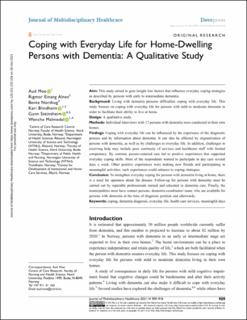| dc.contributor.author | Moe, Aud | |
| dc.contributor.author | Alnes, Rigmor Einang | |
| dc.contributor.author | Nordtug, Bente | |
| dc.contributor.author | Blindheim, Kari | |
| dc.contributor.author | Steinsheim, Gunn | |
| dc.contributor.author | Malmedal, Wenche | |
| dc.date.accessioned | 2021-10-28T09:31:59Z | |
| dc.date.available | 2021-10-28T09:31:59Z | |
| dc.date.created | 2021-04-24T14:14:33Z | |
| dc.date.issued | 2021 | |
| dc.identifier.citation | Journal of Multidisciplinary Healthcare. 2021, 14 (14), 909-918. | en_US |
| dc.identifier.issn | 1178-2390 | |
| dc.identifier.uri | https://hdl.handle.net/11250/2826243 | |
| dc.description.abstract | Aim: This study aimed to gain insight into factors that influence everyday coping strategies as described by persons with early to intermediate dementia.
Background: Living with dementia presents difficulties coping with everyday life. This study focuses on coping with everyday life for persons with mild to moderate dementia in order to facilitate their ability to live at home.
Design: A qualitative study.
Methods: Individual interviews with 12 persons with dementia were conducted in their own homes.
Findings: Coping with everyday life can be influenced by the experience of the diagnostic process and by information about dementia. It can also be affected by stigmatization of persons with dementia, as well as by challenges in everyday life. In addition, challenges in receiving help may include poor continuity of services and healthcare staff with limited competence. By contrast, person-centered care led to positive experiences that supported everyday coping skills. Most of the respondents wanted to participate in day care several days a week. Other positive experiences were making new friends and participating in meaningful activities; such experiences could enhance to coping strategies.
Conclusion: To strengthen everyday coping for persons with dementia living at home, there is a need for openness about the disease. Follow-up for persons with dementia must be carried out by reputable professionals trained and educated in dementia care. Finally, the municipalities must have contact persons, dementia coordinator/-team, who are available for persons with dementia at the time of diagnosis position and afterwards.
Keywords: coping, dementia diagnosis, everyday life, health care services, meaningful days | en_US |
| dc.language.iso | eng | en_US |
| dc.publisher | Dovepress | en_US |
| dc.rights | Navngivelse-Ikkekommersiell 4.0 Internasjonal | * |
| dc.rights.uri | http://creativecommons.org/licenses/by-nc/4.0/deed.no | * |
| dc.title | Coping with everyday life for home-dwelling persons with dementia: A qualitative study | en_US |
| dc.type | Peer reviewed | en_US |
| dc.type | Journal article | en_US |
| dc.description.version | publishedVersion | en_US |
| dc.source.pagenumber | 909-918 | en_US |
| dc.source.volume | 14 | en_US |
| dc.source.journal | Journal of Multidisciplinary Healthcare | en_US |
| dc.source.issue | 14 | en_US |
| dc.identifier.doi | 10.2147/JMDH.S300676 | |
| dc.identifier.cristin | 1906140 | |
| cristin.ispublished | true | |
| cristin.fulltext | postprint | |
| cristin.qualitycode | 1 | |

